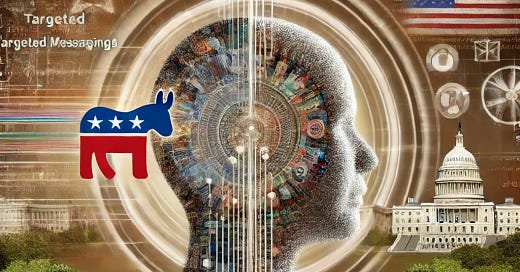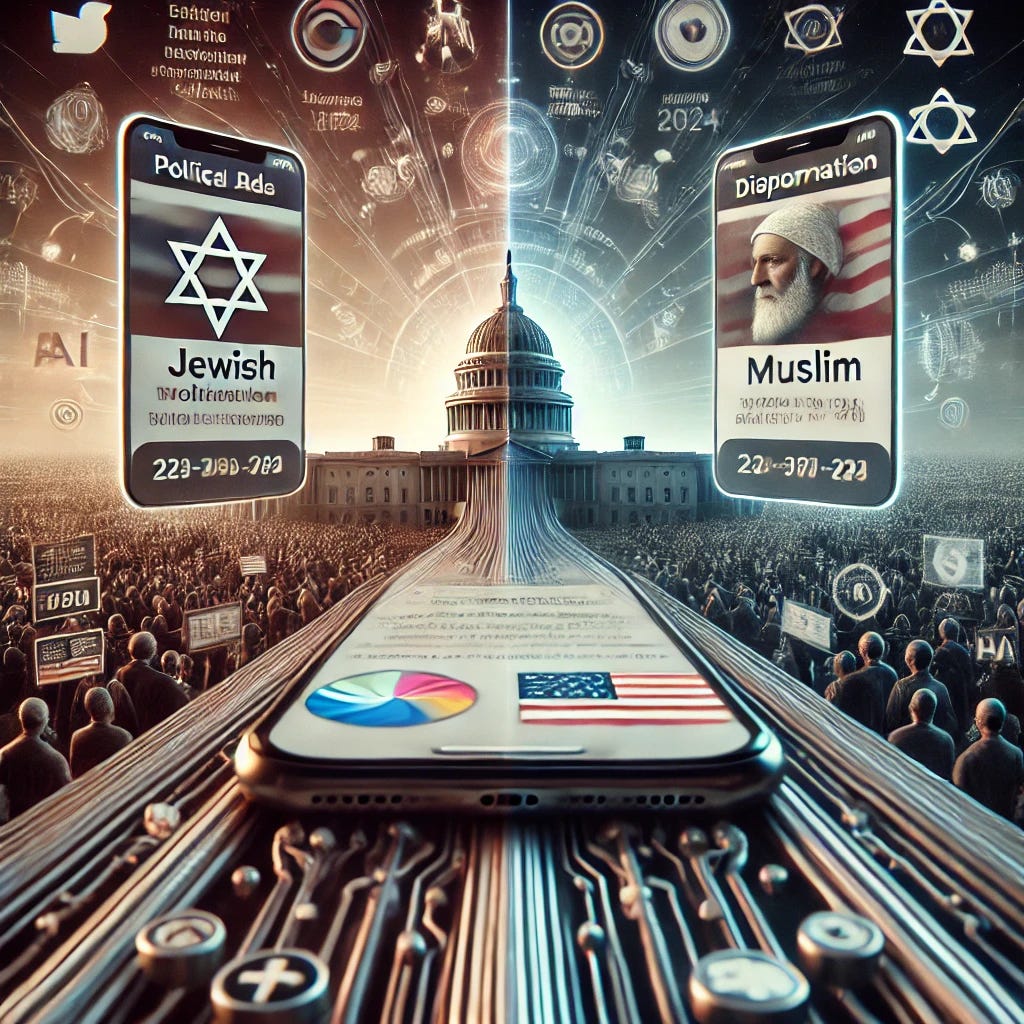The podcast attached to this article is AI-generated using Google Deep Mind’s Notebook LM technology. All of the sources used to generate the podcast are listed below in the “Additional Resources” section.
Over the past year, I've written over a dozen articles about the influence AI could have on the elections. My favorite article was probably the one I wrote right after watching Elon Musk bounce like a human pogo stick at a Trump rally: Why Musk Is Really Jumping Around On Stage: Regulatory Approvals and an FSD/Ride Sharing Market Worth Trillions. Some of my articles were the type of stuff you would expect in an election year with titles like: "How Deep Fakes Are Impacting the 2024 Election."
I took a different spin on this topic when I showed how deepfakes backfired on Trump with his big Taylor Swift blowout: "AI-Generated Images Were Supposed to Manipulate, But They Did the Opposite." I had a grand 'ol time generating images of Donald Trump and Taylor Swift. (Seriously, I found that way too amusing. I do wonder for my mental health sometimes.)
But, after writing over a dozen articles on election disinformation tactics in elections- and an election result that I'm struggling to digest like a spicy meal burning from the inside out- I can’t help but wonder: just how far did AI’s influence really reach?
What Role Did AI Ultimately Play In Our Elections?
With mixed evidence emerging, it appears that while AI played a significant role, its impact may not have been as monolithic as initially feared. Here’s a closer look at AI’s true effects on polarization, targeted messaging, and voter sentiment in one of the most closely-watched elections in recent history.
Microtargeting with AI: The Power and Peril of Precision
AI’s capabilities for microtargeting, powered by psychographic profiling, allowed campaigns to deliver highly tailored messages to specific demographic groups. Data analytics enabled campaigns to segment audiences and reach them with messaging uniquely attuned to their concerns and identities.
For instance, reports showed that PACs funded by Musk-backed groups used sophisticated microtargeting to present contrasting messages to Jewish and Muslim communities in key swing states. In Michigan, where there are significant Muslim populations, ads portrayed Vice President Kamala Harris as closely aligned with pro-Israel views. Conversely, in Pennsylvania, Jewish voters received ads suggesting Harris was anti-Israel. According to Digiday, AI-assisted ad strategy enabled these dual narratives by segmenting voters with incredible precision, creating the perception of personalized attention to each group’s specific concerns.
AI’s Role in Shaping Sentiment on Social Media: The X Factor
One of the most debated aspects of AI’s influence was its role on X (formerly Twitter), where changes in content moderation have led to a platform more tolerant of divisive and at times, unverified information. Under Elon Musk’s ownership, X saw a marked increase in AI-generated and conspiratorial content, some of which leveraged AI’s ability to amplify sensationalist narratives that tend to reinforce existing beliefs. According to The Verge: "Elon Musk created a special system for showing you all his tweets first." This change came about after his Super Bowl tweet did worse numbers than President Biden's, so he ordered the engineers to make major changes to the algorithm.
However, some experts argue that this impact was overstated. A Time article suggested that while AI algorithms contributed to creating echo chambers, the level of polarization attributed to AI alone may be exaggerated. In truth, longstanding social media behaviors—amplified by AI algorithms optimized for engagement—may have played a more modest role in amplifying divides than anticipated. Although AI certainly contributed to content curation, many believe that platform design and user preferences are as responsible for echo chambers as the algorithms themselves.
The Power of Manipulative Campaign Tactics
In 2024, AI-driven campaigns demonstrated how targeted messaging can tap into specific demographic concerns and leverage emotionally charged issues to shape voter perceptions. By analyzing psychographic data, campaigns tailored messages to resonate deeply with voters’ personal beliefs and concerns, focusing on key issues that were likely to elicit strong emotional responses.
According to Digiday and other sources, political action committees (PACs) funded by Elon high-profile donors employed AI to microtarget groups with contrasting messages. For instance, in some regions, messages emphasized candidates' stances on issues sensitive to specific cultural or religious communities. These tactics illustrate how AI can make campaigns feel personal and direct, potentially deepening voters' engagement—or mistrust—by framing political issues in ways that speak directly to their identities and anxieties.
Fusemachines’ analysis highlights that while AI did not necessarily create new divisions, it amplified existing ones by magnifying the most sensitive issues. This ability to pinpoint voter concerns so accurately underscores the power of AI as both a tool for engagement and, potentially, for manipulation in political discourse.
Was AI’s Role in Voter Polarization Overstated?
Despite the concerns, some analyses suggest that AI’s influence on polarization and voter manipulation was less severe than feared. The Time article on AI and the 2024 election argues that while AI made some campaigns more efficient and allowed for sophisticated data-driven messaging, its overall effect was not as dystopian as predicted. Many voters recognized AI-driven ads and took them with a grain of skepticism, aware that such microtargeting was at play. This growing voter awareness reflects a more informed electorate that is becoming increasingly adept at discerning AI’s role in political messaging.
Ethical Concerns and the Need for Responsible AI Use in Politics
While AI’s role may have been more nuanced, ethical concerns remain. The strategy of targeting different groups with contrasting messages risks manipulating emotions and exploiting divisions. Even if AI didn’t single-handedly deepen divides, the use of its tools without clear ethical guidelines raises questions about transparency and accountability.
Final Thoughts: : Navigating AI’s Role in Future Elections
The 2024 election underscored AI’s potential to personalize, target, and engage voters, but it also revealed the limitations and complexities of attributing polarization solely to technology. AI may have enhanced some divisive tactics, but the roots of polarization remain multifaceted, rooted in longstanding social and political divides. Going forward, both voters and policymakers must advocate for responsible AI use, creating a future where technology enhances democratic discourse without compromising its integrity.
I'm a retired educator and freelance writer who loves researching AI and sharing what I've learned.
Stay Curious. #DeepLearningDaily
Additional Resources for Inquisitive Minds
Torres, Diana. AI Self-Regulation Meets Political Upheaval: A Silicon Valley Perspective. Deep Learning Daily. July 23, 2024.
Torres, Diana. Trump's AI Policy Shift. Are We Ready For Unregulated AI? Deep Learning Daily. November 8, 2024.
Torres, Diana. Trump’s AI Policy Shift and Its Potential Impact on the U.S. Tech Landscape. Deep Learning Daily. November 7, 2024.
Torres, Diana Why Musk Is Really Jumping Around On Stage: Regulatory Approvals and an FSD/Ride Sharing Market Worth Trillions. Deep Learning Daily. October 21, 2024.
Torres, Diana. How Deep Fakes Are Impacting the 2024 Election. Deep Learning Daily. Octobeber 5, 2024.
Schiffer, Zoe. Yes, Elon Musk created a special system for showing you all his tweets first. the Verge. 13 February. 2024.
Paul, Kari. “Guardian Stops Posting on Elon Musk’s X, Citing Proliferation of Hate Speech.” New York Post, 13 Nov. 2024, www.nypost.com/2024/11/13/media/guardian-wont-post-on-elon-musks-x-due-to-conspiracy-theories/.
MacLellan, Lora. “German Soccer Club St. Pauli Quits X Platform Over Alleged Hate Speech.” Reuters, 14 Nov. 2024, www.reuters.com/technology/german-soccer-club-st-pauli-quits-x-platform-over-alleged-hate-speech-2024-11-14/.
Pew Research Center. “AI in the 2024 Election: Most Republicans, Democrats Are Concerned.” 5 Oct. 2024, www.pewresearch.org/politics/2024-election-ai-concerns.
Sutherland, Joe, and Schweidel, David. “Candidate AI: The Impact of Artificial Intelligence on Elections.” Emory News Center, 17 Sept. 2024, news.emory.edu/features/2024-candidate-ai-impact-elections.html.
Tutella, Francisco. “Ask an Expert: AI and Disinformation in the 2024 Presidential Election.” Penn State University News, 17 Sept. 2024, www.psu.edu/AI-and-Disinformation-2024-election.
The Times. “Russian Lies May Incite US Election Violence, Security Chiefs Say.” 10 Oct. 2024, www.thetimes.co.uk/article/russian-lies-us-election-violence-2024-vvt9qdcbs/.
Kolodny, Lora. “Bluesky Hits 2 Million Users as X Users Migrate.” The Verge, 16 Nov. 2023, www.theverge.com/2023/11/16/bluesky-public-access-2-million-users.
Peters, Jeremy W. “How Trump’s 2024 Campaign Targeted Specific Demographics with AI Ads.” The New York Times, 7 Nov. 2024, www.nytimes.com/trump-2024-campaign-ai-ads-demographic-targeting.
“How Musk-Funded PACs are Dividing Jewish and Muslim Voters Through AI-Driven Ads.” The Guardian, 8 Nov. 2024, www.theguardian.com/musk-pac-dividing-voters.
“Influence of AI in the 2024 Election.” Perplexity AI, accessed 14 Nov. 2024, www.perplexity.ai/election-ai-influence-2024.
“How AI Shaped the 2024 Election, from Ad Strategy to Voter Sentiment Analysis.” Digiday, 7 Nov. 2024, www.digiday.com/media-buying/how-ai-shaped-the-2024-election-from-ad-strategy-to-voter-sentiment-analysis/.
“Reflecting on AI’s Impact in the 2024 US Elections.” Fusemachines Insights, accessed 14 Nov. 2024, www.insights.fusemachines.com/reflecting-on-ais-impact-in-the-2024-us-elections/.
“AI’s Impact on the 2024 Elections: Overblown or Accurate?” Time Magazine, 10 Nov. 2024, www.time.com/7131271/ai-2024-elections/.
















Share this post